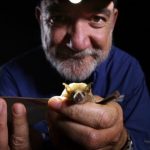Featured in

A fast, cheap and accessible species detection kit.
With our technology, researchers, customs officers and community conservationists could identify snow leopards from their samples 144 faster and 20 times cheaper than the best conventional lab test
Let’s hear what they think…
I want to hear from…
Snow leopard researchers
I want to hear from…
Customs officers
I want to hear from…
Community conservationists
A new tool for snow leopard researchers
- Better track this illusive species
- Pre-screen samples before collection
- Save money on unnecessary lab tests
- Speed up the pace of research
How will this kit impact snow leopard research?
We asked…
Tatjana Rosen
Conservation Adviser – Ilbirs Foundation
Lead for “Vanishing Treasures” project in Kyrgyzstan
A new tool for customs officers
With the WildTechDNA species detection kit, customs officers could positively identify illegal wildlife goods in real-time at our borders. By making it quick, cheap and simple to tell illegal from legal samples, the kit will help law enforcers:
- Streamline the inspection of traded goods
- Speed up the detection of wildlife crime
- Gather evidence to secure convictions
- Save money on expensive lab tests
What does this mean for customs officers?
We asked…
Luke Bond
Wildlife crime consultant
A new tool for community conservationists
With the WildTechDNA species detection kit, community conservationists could take the lead on research in their communities. By giving non-specialists access to simple and affordable tools, we can help them:
- Identify the predators impacting their lives
- Contribute to the research that affects them
- Direct conservation management solutions
- Lead local wildlife and conservation education

Photo credit: Pangje Foundation
Talk to us about the WildTechDNA kit
Time to positive ID:
Our kit vs conventional lab tests


Our tech
DNA fingerprinting technology + paper-based detection =
the quickest, cheapest and simplest way to identify snow leopards from their samples
Simple
Almost as simple as a pregnancy test
Affordable
Costs around $1 per test
Accurate
As accurate as conventional lab tests

Quick
Results in around 30 minutes
Accessible
No specialist training needed
Portable
To bring our tech to market we’re…
Developing the technology through research
Through research, we will solve two major scientific challenges. Ones that have acted as roadblocks to the engineering of low-cost, in-field DNA testing devices.
- First, it is difficult and time-consuming to isolate target DNA from biological samples because the process requires multiple chemical, physical and thermal steps.
- Second, it is difficult to detect a small amount of target DNA in a sample containing a large amount of background material.
Our paper-based hand-held device will operate much like a pregnancy test, performing three functions in one:
- Capturing the DNA from a variety of genetic sources (e.g feces, bone, skin etc.)
- Producing readable copies of the DNA, and
- Detecting the target species DNA through a simple colour change
WildTechDNA – in partnership with McMaster University and the University of Calgary and grant-funded by the Canadian Government (NSERC), Alberta Innovates and the Canadian Oil Sands Innovation Alliance (COSIA) – is beginning laboratory research with a focus on caribou fecal detection.
Caribou are a migratory species highly threatened in Canada and are therefore of considerable importance to both government and industry. Our methodology builds upon the foundational work of Dr Yingfu Li of McMaster University, who developed a paper-based DNA biosensor to detect bacteria in food and water samples.
Exploring a new, collaborative funding model
WildTechDNA is building a partnership model for funding new conservation technology. We’re bringing together the science, conservation, business and public sector communities to scale the opportunity provided by our caribou research to include the big cats.
We currently have in-kind partnership agreements in place with the South African National Biodiversity Institute and the Wildlife Conservation Society. But we would benefit greatly in having the assistance of the snow leopard range countries through GSLEP.
With your support, we can ensure the technology gets to where it is most needed, for the conservation of this species.
Beyond this, our goal and intention is to extend the technology to multiple species, applications and countries across the globe for conservation purposes.
Backed by the world’s wildlife protectors
Hear from us
Just research & development updates & candid pics… promise. (It’s in our privacy policy. You can unsubscribe at any time)
Connect with Natalie











